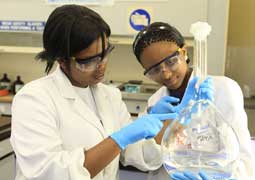
The Select Committee on Education and Technology, Sports, Arts and Culture was today briefed by the Department of Science and Innovation on the Science and Technology Laws Amendment Bill, and on the agreement between the Government of South Africa and the International Centre for Genetic Engineering and Biotechnology (ICGEB) on the Establishment of an International Centre for Genetic Engineering and Biotechnology (ICGEB) component in South Africa.
The ICGEB is an intergovernmental organisation initially established as a special project of the United Nations for the promotion of industrial development for poverty reduction and inclusive globalisation. It has become fully autonomous since 1994. According to its website, it runs 46 state-of-the-art laboratories in Trieste, Italy; New Delhi, India; and Cape Town, South Africa.
Also, according to its website, the organisation plays a key role in biotechnology worldwide for excellence in research, training and technology transfer to industry to contribute in concrete terms to the achievement of sustainable global development, and its operations are aligned to those of the United Nations systems.
The department presented the Science and Technology Laws Amendment Bill to the committee highlighting, among other things, the objectives of the Bill and its proposed amendments to the Bill.
The objects of the Bill include the harmonisation of the processes for the termination of the membership of Boards or Councils of the entities established by the principal Acts; to clarify the requirements for the disqualification of persons from membership of boards or councils; and to provide for the appointment of external persons to committees of boards or councils.
The committee welcomed the presentation and agreed to convene another meeting where it will discuss the process it is going to follow in dealing with the Bill. Furthermore, the committee agreed that, meanwhile, invitation for public comment on the Bill must be made as the principle of public participation demands.
On the presentation on the establishment of the ICGEG in South Africa which the committee also welcomed, the Chairperson of the committee, Mr Elleck Nchabeleng, said he was hearing about this important and strategic resource for the first time, and that its location at the University of Cape Town shouldn’t imply a monopoly to it by only Capetonians. “The centre should be communicated widely in the country to ensure that the objective behind its existence is achieved,” emphasised Mr Nchabeleng.
Furthermore, Mr Nchabeleng asked the department to explain its communication strategies for the centre. Also, members of the committee asked the department to unpack the agreement in simple terms and urged it to highlight its benefits to South Africans.
Members said those benefits must include targets regarding the number of doctoral degrees, especially with regard to female students. According to the department, one of the overarching benefits include the knowledge on genetic engineering techniques. They said such genetic engineering techniques and other scientific knowledge techniques will assist to a greater extent to translate the richness of the plant diversity in South Africa into many ways, such as medicine and food production.
After the committee was satisfied with the answers the department provided on all the questions it asked, it unanimously adopted the report and will recommend the approval of the agreement by the House. Mr Nchabeleng expressed the optimism of the committee on the agreement. “We are looking forward to the fruits of the agreement, and above all, to ensure that the agreement sharpens the competitive edge of South Africa in the world,” said Mr Nchabeleng.
By Mava Lukani
26 May 2020

